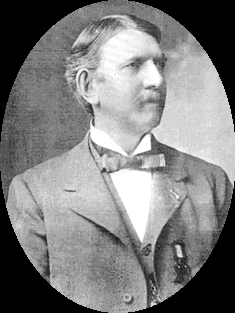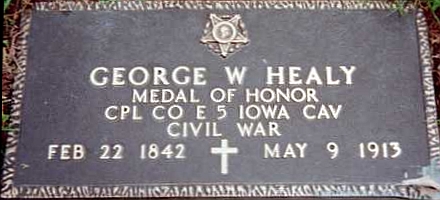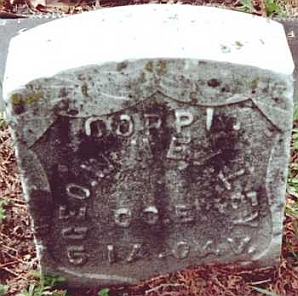Corporal George W. Healey
Congressional Medal of Honor Recipient


During the War Between the States, the Union awarded America's highest decoration, the Congressional Medal of Honor, 1,520 times. Of these, 1,195 went to soldiers, 308 to sailors, and 17 to Marines. Only twenty-five were presented posthumously.
As in every war, the vast majority of heroic acts went unnoticed in the heat of battle. The majority of men in uniform serving in combat units courageously placed their lives on the line over an over again. On occasion, however, specific acts of bravery were formally recognized. This medal both expressed appreciation to the hero and sought to motivate the rest of the troops to similar standards.
One young member of the Fifth Iowa Cavalry was honored for an act on conspicuous gallantry. While a private in Company E, George Healey captured several Confederates while his unit was at a military disadvantage. The citation reads as follows: "When nearly surrounded by the enemy, captured a Confederate soldier, and with the aid of a comrade who joined him later, captured four other Confederate soldiers, disarmed the five prisoners, and brought them all into the Union lines." This accomplishment took place at Newnan, Georgia on 29 July 1864.
The book Deeds of Valor records narrative accounts of many events in which the Medal of Honor was awarded. Fortunately it includes Healey's retelling of this important moment in the history of the Fifth Iowa Cavalry. As the following description of the engagement reveals, Corporal Healey was more than willing to share credit for the capture of the Confederates with one of his regimental companions, Private Thomas O. Martin. It should be noted that Martin survived the war, contrary to the suggestion at the close of this passage.

CORPORAL GEORGE W. HEALEY, of Troop E, Fifth Iowa Cavalry, who participated in General McCook's Cavalry Raid during Sherman's Atlanta campaign, says: "At Newnan, Georgia, July 29, 1864, our company was ordered out on the skirmish line which was on the extreme left of our main line of battle. The engagement lasted more or less all day. In moving out we struck into low ground, timber and heavy undergrowth. It was difficult to keep our alignment and intervals and consequently I soon discovered that I was alone and unobserved. Suddenly I ran into a body of Confederate soldiers. Their officer was giving a command to mount and count fours. They did not see me, so I began to retrace my steps and moved back to find my command, when, to my surprise, I came upon a Confederate who was seated on a log and ordered him to drop his gun, which he did. I picked it up and threw it into the creek. Just as I was about to move with my prisoner I heard someone approaching us. Ordering the rebel to lie down, I sought protection from behind a tree and waited. To my satisfaction I recognized in the new arrival Private Oscar Martin, of my company, who was bareheaded and coming toward me at a quick pace. He had lost his way. Looking at my prisoner and pointing to the direction whence he had come, he said: 'The woods are full of 'em.' 'Yes,' I replied, pointing to where I had been, 'and over there, too.'"Martin scrutinized my prisoner and asked: 'What have you got in that bag?'
"The rebel answered: 'Chewing tobacco.'
"Whereupon Martin compelled him to disgorge, and, I confess, it came in handy.
"As we were about to resume our march, we heard men talking. We got behind a tree and the next minute four Confederates came, trailing in Indian fashion, toward us. Martin and I stepped from behind the trees and covered them. I ordered: 'Halt! Drop those guns!' but had to repeat the command before they obeyed. I then marched them some fifty feet, halted them, and ordered one man to advance at a time, when Martin and I relieved them of their revolvers, holsters and belts. Next, while Martin kept guard, I went back, removed the cartridges from the rifles they had dropped and returned the empty guns to them. We moved toward our lines and reached them without further interruption, where we turned our five prisoners over to General McCook, who paid us a high compliment."
Corporal Healey received a Medal of Honor; his companion died or he would doubtless have been honored in a like manner.
Healey, a nineteen year old native of Iowa, enlisted on 9 September 1861. He transferred to the Fifth Iowa Cavalry Consolidated after the initial enlistment of the soldiers expired and the regiment absorbed members of the Fifth Iowa Infantry. In February of 1865 he was promoted to Sixth Corporal, and he ended the war as a First Corporal.
The heroic actions of Corporal Healey were consistent with the fine record established by the entire regiment throughout the course of the entire, tragic conflict. We are also pleased to have a postwar photograph of this hero and some of his companions from Company E. Below you can see an image of the modest headstone that this Medal of Honor recipient shares with his comrades.


Return to the Fifth Iowa Cavalry Personnel
Return to the History of the Fifth Iowa Cavalry